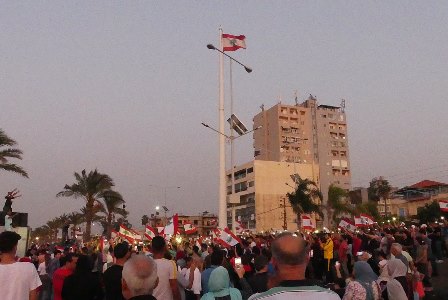
“Let me speak frankly. The Lebanese do not expect fruitful results from this meeting. In the view of the Lebanese people, this meeting will be like those that came before it. And after, it will be as it was before, or perhaps worse,” these were the words of Lebanese prime minister, Hassan Diab. He was speaking at a summit of Lebanese political leaders on Thursday 25 June meant to be looking for a solution to the country’s ongoing crisis.
The economic social and political crisis has deepened during Covid-19. Hunger and the inability to supply even a basic subsistence to many forcing them back out onto the streets to protest in early April.
Since then, the currency has plunged further. In the last week, it has gone in just a few days from 6,000 Lebanese lira to the US dollar, to 7,000 lira to the dollar. This means that a worker on the minimum wage will be receiving less than $100 a month.
As we warned in previous articles on socialistworld.net, without the development of a united working-class struggle the danger of new sectarian polarization is present in the situation given people’s desperation. Supporters of Shia pro-government groups, Hezbollah and Amal, were filmed on protests several weeks ago, chanting about Sunni religious figures. Sectarian clashes have also been reported in recent weeks.
Repression against the protests has also been stepped up. Renewed protests a fortnight ago called for fresh elections a ‘coup’. Many protesters are being detained for the crime of ‘insulting the president’ which can carry a two-year sentence.
The situation of migrant workers is also extremely precarious. Ten thousand registered for flights home, while hundreds of workers have been dumped by their employers at the doors of their embassies.
Dead-end
But the Lebanese government is in a dead-end. While they still have ongoing negotiations with the IMF for new loans, these would come with conditions, including further privatisation and attacks on public sector jobs and pay. These measures will undoubtedly be carried out in the name of challenging corruption but are merely a way to transfer the way exploitation and enrichment of the country’s political cliques while making workers’ pay the price.
As in many countries around the world, Chinese involvement in Lebanon increased in recent years, including donations of PPE during the current crisis. China is now Lebanon’s top source of imports, accounting for over £2bn a year. As with some southern European countries, there is a perception that China, at least in the short-term, maybe a more lenient lender. US rhetoric and hostility towards Hezbollah (due to its links with the Iranian regime) may end up pushing the Lebanese government, which Hezbollah is part of, further into the arms of China.
Whichever way the government is able to get financial assistance, they will end up, sooner or later, making working-class people pay for the debts. Attacks on the pay and conditions of workers who are organized in the independent trade unions will bring them to the first rank of the struggle. This opens up the potential of a more organised working class resistance to the government.
